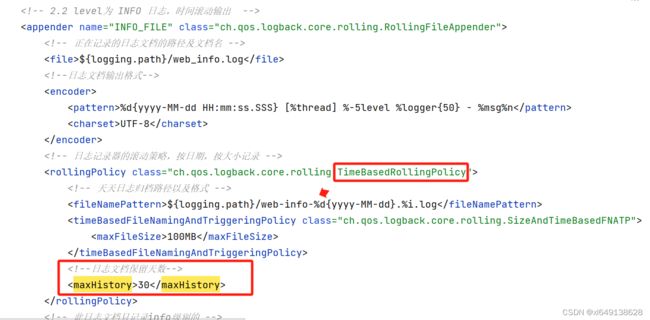logback服务器日志删除原理分析
查看以下的logback官方文档
Chapter 4: Appenders![]() https://logback.qos.ch/manual/appenders.html
https://logback.qos.ch/manual/appenders.html
按文档说明,maxHistory是设置保存归档日志的最大数量,该数量的单位受到fileNamePattern里的值%d控制,如果有多个%d,只能有一个主%d,其他的要用aux参数标记为辅助令牌。
/var/log/%d{yyyy/MM, aux}/myapplication.%d{yyyy-MM-dd}.log
比如上面的fileNamePattern主%d是%d{yyyy-MM-dd},意味着显示的文件名模式按年份和月份组织日志文件夹,但每天午夜滚动日志文件。
也就是说maxHistory是归档日志的最大数量,该数量的单位可以是多种,类型如下
小时、天、周、毫秒、秒、分钟、半天、月。
单位受%d控制。
cleanHistoryOnStart参数用于启动时删除需要删除日志文件,如果不配置默认是false,意味着启动时不删除日志。
在项目中我们发现当触发日志删除条件时,一些历史久远的日志无法删除。那日志的删除逻辑时怎么样的?下面我们先做了逻辑总结,各位有兴趣可以查看下面的源码分析。
logback是无法删除历史很久远的日志的。比如maxHistory设置为30,单位设置为日。那么执行时,根据单位删除的是距离今天31天前的到距离今天62(31+32-1)天前(的日志。
例如:今天是2023年10月16日删除的是31天前(2023年9月15日)到62天前(2023年8月15日)的日志。
这部分逻辑见以下源码分析:
以下是日志配置文件:
MyContextName
debug
${CONSOLE_LOG_PATTERN}
UTF-8
${logging.path}/web_debug.log
%d{yyyy-MM-dd HH:mm:ss.SSS} [%thread] %-5level %logger{50} - %msg%n
UTF-8
${logging.path}/web-debug-%d{yyyy-MM-dd}.%i.log
100MB
30
debug
ACCEPT
DENY
${logging.path}/web_info.log
%d{yyyy-MM-dd HH:mm:ss.SSS} [%thread] %-5level %logger{50} - %msg%n
UTF-8
${logging.path}/web-info-%d{yyyy-MM-dd}.%i.log
100MB
30
info
ACCEPT
DENY
${logging.path}/web_warn.log
%d{yyyy-MM-dd HH:mm:ss.SSS} [%thread] %-5level %logger{50} - %msg%n
UTF-8
${logging.path}/web-warn-%d{yyyy-MM-dd}.%i.log
100MB
30
warn
ACCEPT
DENY
${logging.path}/web_error.log
%d{yyyy-MM-dd HH:mm:ss.SSS} [%thread] %-5level %logger{50} - %msg%n
UTF-8
${logging.path}/web-error-%d{yyyy-MM-dd}.%i.log
100MB
30
ERROR
ACCEPT
DENY
在上面的配置文档中,如果我们打印一个info级别的日志,执行的是以下的策略
在上面的配置文件中发现fileNamePattern中是%d{yyyy-MM-dd},也就是说maxHistory的数量是30,单位是天。
当日切时,会执行TimeBasedRollingPolicy里的rollover方法。
++TimeBasedRollingPolicy.rollover()
++TimeBasedArchiveRemover.cleanAsynchronously(Date now)
++ArhiveRemoverRunnable.run()
++ArhiveRemoverRunnable.clean(Date now)
通过rollover会执行ArhiveRemoverRunnable中的clean方法
public void clean(Date now) {
long nowInMillis = now.getTime();
//获取要删除的时间段
int periodsElapsed = this.computeElapsedPeriodsSinceLastClean(nowInMillis);
this.lastHeartBeat = nowInMillis;
if (periodsElapsed > 1) {
this.addInfo("Multiple periods, i.e. " + periodsElapsed + " periods, seem to have elapsed. This is expected at application start.");
}
//循环删除日志文件
for(int i = 0; i < periodsElapsed; ++i) {
//获取开端,getPeriodOffsetForDeletionTarget返回的值是yaml
//配置文件配置的maxHistory - 1
//periodsElapsed值是32,那么offset的值是-30-1到-30-1-31即-31到-62
int offset = this.getPeriodOffsetForDeletionTarget() - i;
//dateOfPeriodToClean返回的是当前时间31天到62天前的数据
Date dateOfPeriodToClean = this.rc.getEndOfNextNthPeriod(now, offset);
//执行删除动作
this.cleanPeriod(dateOfPeriodToClean);
}
}分析computeElapsedPeriodsSinceLastClean该方法会计算删除日期范围。
int computeElapsedPeriodsSinceLastClean(long nowInMillis) {
long periodsElapsed = 0L;
if (this.lastHeartBeat == -1L) {
this.addInfo("first clean up after appender initialization");
periodsElapsed = this.rc.periodBarriersCrossed(nowInMillis, nowInMillis + 2764800000L);
periodsElapsed = Math.min(periodsElapsed, 336L);
} else {
periodsElapsed = this.rc.periodBarriersCrossed(this.lastHeartBeat, nowInMillis);
}
return (int)periodsElapsed;
}在上面的代码中可以看到 periodBarriersCrossed方法计算时间段,该方法有两个入参分别是start和end,上面的代码中可以看到这两个入参传入的值是nowInMillis和nowInMillis + 2764800000L。
在periodBarriersCrossed方法中可以看到diff = endFloored - startFloored;而endFloored和startFloored生成使用的是同一个方法同一套规则,两者的差异只和入参有关。diff计算出的差值还是2764800000L,如果logback-spring.yaml文件里配置的单位是日,进入的是以下代码里
case TOP_OF_DAY:
return diff / 86400000L;这段逻辑。2764800000L/86400000L的到的值是32。
public long periodBarriersCrossed(long start, long end) {
if (start > end) {
throw new IllegalArgumentException("Start cannot come before end");
} else {
long startFloored = this.getStartOfCurrentPeriodWithGMTOffsetCorrection(start, this.getTimeZone());
long endFloored = this.getStartOfCurrentPeriodWithGMTOffsetCorrection(end, this.getTimeZone());
long diff = endFloored - startFloored;
switch(this.periodicityType) {
case TOP_OF_HOUR:
return (long)((int)diff) / 3600000L;
case TOP_OF_DAY:
return diff / 86400000L;
case TOP_OF_WEEK:
return diff / 604800000L;
case TOP_OF_MILLISECOND:
return diff;
case TOP_OF_SECOND:
return diff / 1000L;
case TOP_OF_MINUTE:
return diff / 60000L;
case HALF_DAY:
default:
throw new IllegalStateException("Unknown periodicity type.");
case TOP_OF_MONTH:
return (long)diffInMonths(start, end);
}
}
}periodsElapsed = Math.min(periodsElapsed, 336L);取periodsElapsed和336两者之间的最小值。
最终periodBarriersCrossed返回值为32即时间间隔为32天。
继续分析clean方中cleanPeriod方法,源码如下,该方法找到传入日期文件夹中的文件列表的执行删除动作 。
public void cleanPeriod(Date dateOfPeriodToClean) {
//获取要删除日期文件夹下的文件列表
File[] matchingFileArray = this.getFilesInPeriod(dateOfPeriodToClean);
File[] arr$ = matchingFileArray;
int len$ = matchingFileArray.length;
//循环删除日期文件夹下的日志文件
for(int i$ = 0; i$ < len$; ++i$) {
File f = arr$[i$];
this.addInfo("deleting " + f);
//删除文件
f.delete();
}
if (this.parentClean && matchingFileArray.length > 0) {
File parentDir = this.getParentDir(matchingFileArray[0]);
this.removeFolderIfEmpty(parentDir);
}
}